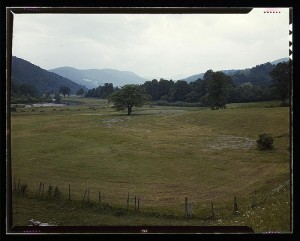Oral histories of the land: Creating community dialogues on the environment
31 December 2012 – Will Walker
 Doing public programs is never easy, but it is the most immediate and rewarding way to engage directly with your audience. This past semester, the Cooperstown Graduate Program’s oral history project experimented with a new type of public program. Taking our cue from the statewide “Community Conversations” sponsored by the New York Council for the Humanities, which also provided funding for our project, we decided to use our large archive of oral histories as the basis for a series of dialogues about important environmental topics.
Doing public programs is never easy, but it is the most immediate and rewarding way to engage directly with your audience. This past semester, the Cooperstown Graduate Program’s oral history project experimented with a new type of public program. Taking our cue from the statewide “Community Conversations” sponsored by the New York Council for the Humanities, which also provided funding for our project, we decided to use our large archive of oral histories as the basis for a series of dialogues about important environmental topics.
The “Community Conversations” model suggests using a primary source, or “shared text,” on a certain topic to provide a starting place for conversation within a group of willing participants. Currently, the council trains facilitators and offers funding for dialogues on democracy and civic participation; the Martin Luther King, Jr. Day of Service; and the 9/11 National Day of Service and Remembrance. In our area of upstate New York, perhaps the most pressing public issue is stewardship of the environment and, in particular, the question: Is there any safe way to extract natural gas from the shale that lies beneath us? We decided that the theme of our programs, then, would be “Oral Histories of the Land: Community Dialogues about our Natural Resources.”
Rural New York is in the midst of a large environmental debate, as the “hydrofracking” industry threatens to move into large swaths of the southern and central parts of the state. Consequently, natural resources, water use, and the importance of the land seemed to us to be ideal topics to address. These topics also aligned perfectly with our archive of oral histories, which Cooperstown Graduate Program students have been compiling since the mid-1960s. In partnership with the New York State Historical Association, which houses the collection, this community-focused and student-driven oral history archive is a valuable resource on the history of agriculture, New York State folklife, and rural living. Although the collection is very rich, it is underutilized. As a result, we are always looking for opportunities to get the recordings off the archive shelves and into the ears of the local community.
Facilitating the dialogues was an adventure, but, somewhat to our surprise, fluid and poignant conversations occurred with relative ease. Completing four programs in three months, with an average attendance of 20 people of varying ages and backgrounds, we were able to reach audiences in three different rural communities. We started each program by playing a small selection of oral history segments. Will Walker then served as facilitator for the dialogue, using both pointed and open-ended questions about the recordings to promote discussion. The questions prompted participants to reflect on what they had heard and to relate the oral histories to past and present environmental issues. The discussions varied from thoughts about water quality to detailed information about maple sugaring to comparisons of traditional uses of the land and contemporary resource extraction. One theme stood out, however, in all of the programs: Our land is important. While participants often disagreed with one another on how water resources should be controlled or how resources should be harvested from the land, everyone seemed to agree that the land is the most essential resource we have.
Success is an understatement of the way we feel about these programs. Further interest from community members has encouraged us to continue thinking about possibilities for future programs and new ways to introduce the audience to our collection of oral histories. Gone are the days of collecting for collecting’s sake; finding uses for these recordings that serve the community is the highest calling our project could serve.
~ Haley Gard is an M.A. student in history museum studies at the Cooperstown Graduate Program. This year, she is the graduate assistant in charge of the oral history project. Will Walker is assistant professor of history at the Cooperstown Graduate Program (State University of New York-Oneonta).
Image: Farmland along the upper Delaware River in New York state, photographed by John Collier in 1943 (Library of Congress)



